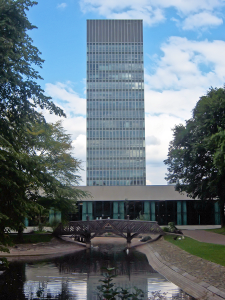“If it’s anything longer than 700-800 words people tend to switch off because it looks too long on the page”
“Something engaging, accessible, the things that do best tend to plug into something of wider interest, which doesn’t necessarily mean directly relevant”

History Matters is a new shared blog from the Department of History at the University of Sheffield. It is written by Sheffield historians including staff, students, alumni and friends, and is currently co-ordinated by Dr Caroline Dodds Pennock, lecturer in International History. Within the first three months of its existence topics covered have included the Papacy (related to the recent election of a new Pope, Francis I); Richard III (due to the confirmation of the king’s body being found); and the end of the Maya calendar (which occurred at the end of last year).
The blog is therefore concerned with showing how historical research – whether that is into recent history or medieval history – has relevance today. Subjects that interest us or matter to us, have connections to things past and to the research going on within any department of History in this country. This initiative by Sheffield, then, is an attempt to show that this is the case, and to give a focus for blogging that showcases the department, the individual research, and the History profession in general.
Whilst talking with Dr Caroline Dodds Pennock I realised that to create a departmental blog is not a simple thing to achieve. First, enough staff members need to be on board. This is as true for a History Department as it is any other institution – indeed; it is something that all collaborative blog authors have so-far mentioned in the interviews. But then there is the question of what to do with such a blog – it could quite easily have no focus. So latching on to a particular theme that relates to the diverse research interest of a whole department is no easy thing to do, but also a necessary thing to do. If, after all that, a choice is successfully made then there is still a further issue to overcome: the blog title. Dr Dodds Pennock noted that they had first thought to call it something along the lines of Sheffield History blog, to reflect the fact that it is the blog of the Department of History at the University of Sheffield. But this suggests that the blog will be about the history of Sheffield itself. By choosing the title History Matters, again you risk going too far the other way – it no longer reveals itself as a departmental blog – part of the purpose is to showcase the department.
I think History Matters has got it about right. The title is accompanied by a sub-title ‘History brought alive by the University of Sheffield’. On the blog itself there is also a University of Sheffield logo and the banner is of the Arts Tower (a relatively well-known building that forms part of the university). The top-level menu also provides links to the department website, and other sites related to the research interests of the departments members. Even the URL includes the Sheff.ac.uk element, drawing the blog further into a wider set of online resources.
The podcasted interview is available to listen online or download. It is 31 minutes long.
The History Matters Blog, Caroline Dodds Pennock (Sheffield) – 11 March 2013
Podcast:
Outline of questions asked during the interview:
Purpose of the blog
- Before we begin could you tell us a little more about yourself?
- Let’s move on to the blog itself. This blog is run as a joint departmental effort focused around the theme of history as having present day importance. Could you tell me something about how this collaboration came about and when it was started?
- Do you remember what discussions were had at the time? What were the concerns, priorities, and hopes for the blog? Could you give us an insight into the original thought processes?
- Which blogging platform did you use and for what reason? What did it offer you that made it the most appealing and useful?
- This is a collaborative blog. How is this managed? Is there a process to obtain posts from each member, or any method for selecting topics, or is it done more informally?
Promotion and popularity
- Who do you think is your main audience? Does this affect what is written on the blog?
- In your view how successful has the blog been and what do you base this view on? (i.e. stats, public discussion, in-house interest etc.)
- How many people tend to visit the blog each month?
- Have you received much in the way of feedback from those writing blog posts and those visiting the blog? Do visitors often leave comments related to particular blog posts?
- How have you promoted the blog? Other social media (Twitter, Facebook etc.), websites, leaflets etc.?
Best practice
- In your view, what makes a good blog post?
- Do you have any suggestions for best practise in using and managing blogs as a group of scholars, or as an institution or individual?
- Is there anything else you would like to add?